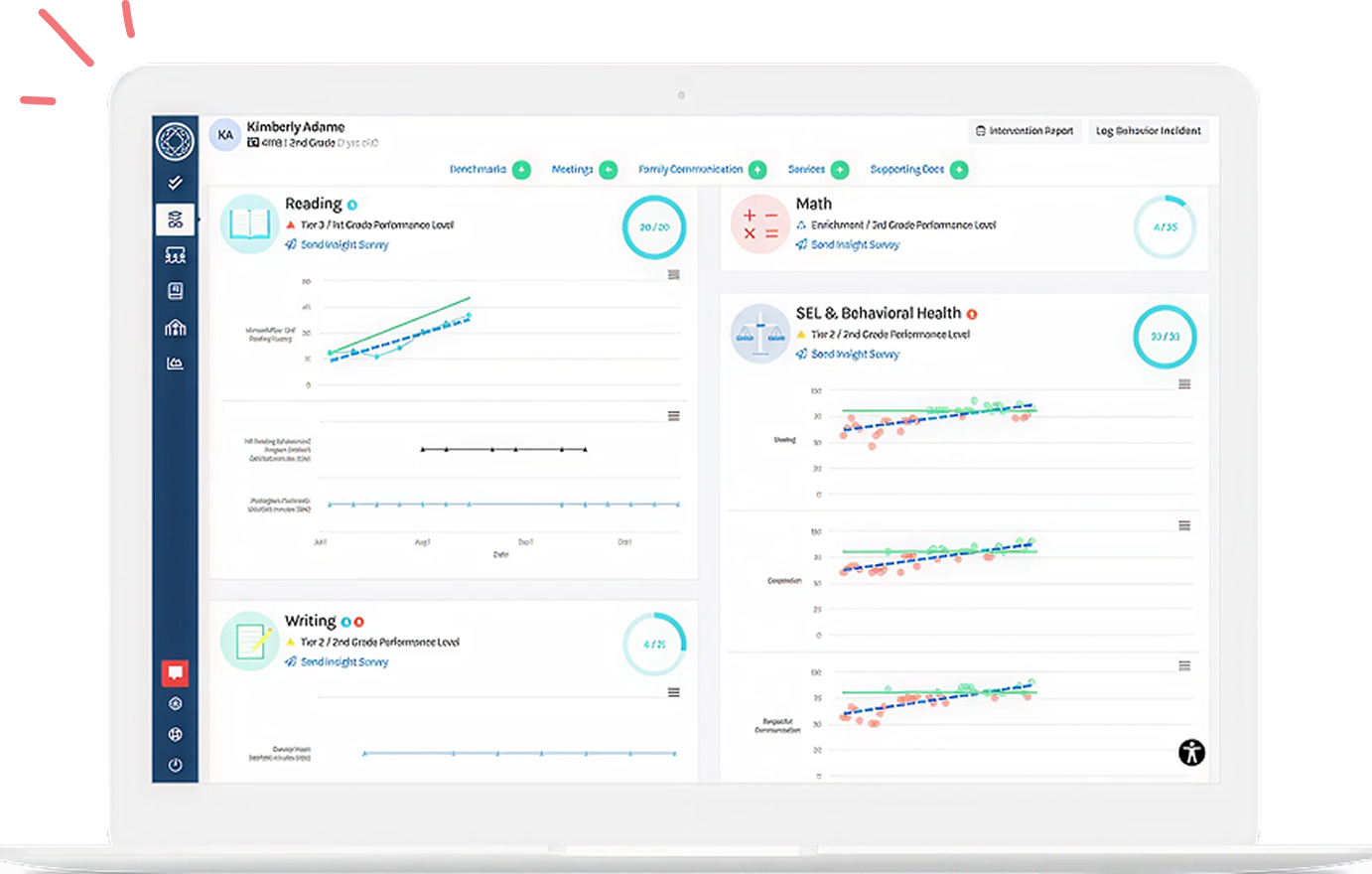For parents,* the education journey for their child can be a rollercoaster of emotions. From the excitement of new beginnings to the concerns that they are making the best decisions for their child’s well-being, every parent's heart is deeply intertwined with their child's learning experiences. The impacts of decisions parents and families must make regarding their child’s education can be long-lasting, reaching far behind students' K-12 lives.
Within the context of the Multi-Tiered System of Supports (MTSS), appropriate parental consent preserves the opportunity for parents to understand the implications of decisions and encourages educators and leaders to collaborate with parents to make well-informed decisions about their child's educational journey.
Beyond Feelings: Laws and Rights
Parental consent in education extends beyond emotions and is intricately tied to laws protecting children's rights and fostering cooperation between schools and families. Particularly within the Multi-Tiered System of Supports (MTSS) context, parental consent takes on heightened significance. MTSS is an educational framework designed to offer tailored assistance to students with varying levels of needs.
One legal framework influencing decisions within MTSS is the Protection of Pupil Rights Amendment (PPRA), a federal law that safeguards parental rights by mandating consent for students to participate in activities that involve gathering sensitive information. This encompasses surveys or assessments on mental health, social-emotional well-being, or other sensitive subjects.
The Individuals with Disabilities Education Act (IDEA) explicitly defines parental notification, involvement, and consent through Procedural Safeguards. When there is a suspicion of a disability, IDEA mandates that schools involve parents in the evaluation and identification process. Directly related to MTSS practices, schools must notify parents about their concerns, seek parental consent for evaluations, and include parents' input in determining whether a child has a disability that requires special education services. These safeguards ensure that parents have the right to participate in meetings, provide informed consent for evaluation, placement, and receipt of services, receive timely and accurate information, and collaborate with the school to develop an Individualized Education Program (IEP) tailored to their child's unique needs.
Understanding the Continuum of Consent
Consent isn't a one-size-fits-all concept; it spans a continuum from notification to active consent that supports various levels of collaboration. Let's break down these different levels of consent using relatable scenarios within the MTSS framework:
Notification: Notification is a method used to inform parents and families of a school-based activity, event, news, or process. Notifications can range from classrooms to grade levels to the entire school district. Related to MTSS and Tier 1, notifications can be shared with parents and families about adopting the new curriculum or upcoming statewide assessments.
Informed Consent: Informed consent means that people are given complete and easy-to-understand details about a specific action, process, or choice before they agree to it. This helps them grasp why it's happening, what good or bad things might come from it, other options they have, and any important facts linked to their decision.
- Active Consent: Active consent occurs when parents/families are asked to provide their written consent before the school can act. For example, if the school intends for a child to regularly meet with an on-campus mental health provider, they must first acquire active consent from a parent before moving forward. Under IDEA, active written consent is also required for evaluations, placement changes, or service delivery for students with disabilities. This includes using a translator if language is a barrier to understanding.
![]() Picture this: A child's school believes a targeted intervention could benefit your child. You receive a personalized plan that outlines the strategies and goals of the intervention. By actively agreeing to the plan, you provide your consent for the implementation of the MTSS strategies.
Picture this: A child's school believes a targeted intervention could benefit your child. You receive a personalized plan that outlines the strategies and goals of the intervention. By actively agreeing to the plan, you provide your consent for the implementation of the MTSS strategies.
- Passive Consent: Passive consent occurs when the school assumes permission unless the parent takes action to object. Parents are still informed about the school’s actions, but the school will proceed unless the parent denies permission.
![]() Picture this: A child's school has planned a series of targeted support sessions for the 3rd grade after receiving the results of a social-emotional screener administered schoolwide. Instead of actively seeking your consent, the school sends a letter that your 3rd-grade child will be included unless you object. This is passive consent,
Picture this: A child's school has planned a series of targeted support sessions for the 3rd grade after receiving the results of a social-emotional screener administered schoolwide. Instead of actively seeking your consent, the school sends a letter that your 3rd-grade child will be included unless you object. This is passive consent,
Compliance in Parental Consent
Compliance is crucial to the parental consent puzzle, especially within the MTSS framework. Educational institutions must adhere to legal requirements while seeking consent for MTSS services. This involves clear communication, providing options, transparent documentation, and respecting parents' decisions.
![]() Picture this: A school sends out a clear and easy-to-understand consent form for implementing specific MTSS interventions. The form outlines the purpose, potential benefits, and any potential concerns in plain language. By providing such detailed information, the school complies with legal requirements and builds trust with parents by ensuring they are well-informed.
Picture this: A school sends out a clear and easy-to-understand consent form for implementing specific MTSS interventions. The form outlines the purpose, potential benefits, and any potential concerns in plain language. By providing such detailed information, the school complies with legal requirements and builds trust with parents by ensuring they are well-informed.
|
|
Facilitate and Keep Track of Family CommunicationsBranching Minds offers districts customizable template letters for easy family communication for teachers. The letters are logged and dated on the students' overview page, with notes and attachments available for review by the student's support team. This helps educators streamline communication while ensuring consistency.
|
|
|
Beyond Compliance: Logic and Need Behind Parental Consent in MTSS
Parental consent within the MTSS framework isn't just a legal box to check—it's a logical and ethical necessity. As experts, educators are responsible for clearly articulating the implications of acting or not acting in any scenario, including giving the parent a variety of options that best support the student. Laws that protect parental decision-making were not put in place to cause barriers to educators but to ensure that the child has access to appropriate education and future opportunities.
In an age of data privacy concerns and individualized learning plans, parental consent bridges school practices and family values within the MTSS context. Objection on that parent’s end does not warrant a lack of trust, but a mutual agreement to consider all other options before making a decision that has lasting impacts and consequences on a student.
![]() Picture this: A 4th-grade child's school team convenes to consider special education and placement on an alternative curriculum for students with disabilities. Because the child is in 4th grade, the school team does not consider sharing the long-term implications on the student’s diploma and career options. In this scenario, the non-experts, or family, may have made a different decision had they understood the far-reaching implications.
Picture this: A 4th-grade child's school team convenes to consider special education and placement on an alternative curriculum for students with disabilities. Because the child is in 4th grade, the school team does not consider sharing the long-term implications on the student’s diploma and career options. In this scenario, the non-experts, or family, may have made a different decision had they understood the far-reaching implications.
Cultural Acknowledgement within Parental Consent
Understanding different cultures is essential regarding parental consent in education, particularly within the MTSS framework. Cultures shape values, beliefs, and norms, influencing how parents perceive and respond to consent requests for additional support, assessment, and/or counseling within an MTSS framework. What might be considered a straightforward process in one culture could be laden with nuances and sensitivities in another.
![]() Picture this: In a multicultural school setting, a teacher realizes that some parents hesitate to consent to MTSS interventions due to cultural beliefs. To bridge this gap, the school involves cultural liaisons to conduct workshops that address concerns brought forward by cultural identities, and ensures that parents are comfortable with the proposed MTSS strategies. This thoughtful approach not only respects diverse cultural backgrounds but also ensures that every parent can make informed decisions about their child's education within the MTSS framework.
Picture this: In a multicultural school setting, a teacher realizes that some parents hesitate to consent to MTSS interventions due to cultural beliefs. To bridge this gap, the school involves cultural liaisons to conduct workshops that address concerns brought forward by cultural identities, and ensures that parents are comfortable with the proposed MTSS strategies. This thoughtful approach not only respects diverse cultural backgrounds but also ensures that every parent can make informed decisions about their child's education within the MTSS framework.
|
In recent times, there has been an increased focus on the area of social-emotional learning, particularly in terms of obtaining parental consent and providing adequate support for students. Beyond the surface, there exist intricate layers of cultural norms, beliefs, and values that shape a parent's perspective. Approaches to emotional expression and management can vary significantly across cultures. By acknowledging and respecting cultural concerns, schools can work towards creating an inclusive environment that respects diverse viewpoints while also prioritizing the social-emotional needs of every student. |
Language for Empowered Decisions
The language used when seeking parental consent within the MTSS framework matters immensely. It should be inclusive, transparent, and respectful, understanding of cultural and various family structures. Notification and consent requests must avoid jargon or acronyms, provide context, and emphasize the value of parental involvement, which can make the consent process a positive experience for parents.
![]() Picture this: A school wants to implement a new tier of support within the MTSS framework for students facing emotional challenges. Instead of using technical terms, the consent form explains the purpose, benefits, and available resources in a way that resonates with parents. Using language that connects with parents, the school invites open communication and fosters a collaborative decision-making process within the MTSS framework.
Picture this: A school wants to implement a new tier of support within the MTSS framework for students facing emotional challenges. Instead of using technical terms, the consent form explains the purpose, benefits, and available resources in a way that resonates with parents. Using language that connects with parents, the school invites open communication and fosters a collaborative decision-making process within the MTSS framework.
A Checklist for Getting Parental Consent in MTSS Right
Here's a quick checklist to ensure that parental notification and consent processes within the MTSS framework are effective and respectful:
| When in doubt, at a minimum, include parental notifications for anything beyond standards-based instruction for parents and families. | |
| Provide clear, accessible information about the purpose and implications of the support or MTSS interventions. | |
| Provide interpreters and native language consent. | |
| Offer different consent options that respect parents' preferences and cultural beliefs. | |
| Ensure that consent forms for MTSS are easy to understand and jargon-free. | |
| Establish clear and simple processes for parents to ask questions and seek clarification about MTSS strategies. | |
| Provide a space to share examples and precedent outcomes so the parent understands various options available and potential outcomes aligned to that course of action. | |
| Respect parents' decisions by offering alternative solutions that support the student and family’s wishes within the MTSS framework and ensure confidentiality in handling sensitive information. |
|
I have had the opportunity to collaborate with many families as a district administrator and a special education specialist for several years. I have sat hand in hand with families on their sofas as they made decisions that impacted their young children’s lives forever. As educators, we are responsible for identifying the most favorable options for our students and their futures. Ultimately, the student suffers when families and schools fail to collaborate. - Britt Shurley, Director of Professional Services, Branching Minds |
Teachers play a vital role in supporting parents through the consent process within the MTSS framework. Providing timely information about student’s struggles, receipt of interventions, addressing concerns related to MTSS, and actively engaging parents can foster a culture of trust and collaboration. As a classroom teacher, understanding the nuances and long-term implications of decisions may be daunting. Districts can provide support advocates and resources to reduce confusion for educators and families to use when making decisions. Leaders must create an environment where educators have the resources and training to effectively facilitate the consent process for MTSS services.
Parental consent within the MTSS frameework goes far beyond paperwork; it reflects respect, collaboration, and empowerment. By understanding the legal landscape, appreciating the continuum of consent within MTSS, and ensuring appropriate processes, educators and leaders can create an educational journey where parents are informed partners, and children thrive in an environment of care, personalized support, and cooperation.
*“parent” encompasses any guardian of a student
ADDITIONAL RESOURCES:
- MTSS SUCCESS STORY: How a School Utilized MTSS to Build Trust & Positive Communication With Families
- GUIDE: MTSS Guide for Families and Community Members
- DOWNLOAD: 5 Resources for Building Positive Family Relationships
- WEBINAR: How to Ensure that MTSS is Clearly Communicated and Understood by All Stakeholders
- BLOG: 5 Reminders To Strengthen & Foster Family Engagement Within the MTSS Process
- BLOG: How To Speak With Families and Communities About MTSS
![[Guest Author] Brittany Shurley-avatar](https://www.branchingminds.com/hs-fs/hubfs/image0.jpeg?width=82&height=82&name=image0.jpeg)
About the author
[Guest Author] Brittany Shurley
Brittany Shurley has served students, educators, and leaders in various roles throughout her career including as a classroom teacher, learning disabilities specialist, school-based leader, and district level administrator. Brittany has extensive experience in facilitating the implementation of an MTSS at the district and school levels. She is passionate about ensuring teachers have the tools to promote safe, healthy, and engaging learning environments where students are experiencing success.

Your MTSS Transformation Starts Here
Enhance your MTSS process. Book a Branching Minds demo today.












.png?width=1436&height=956&name=Navigating%20Parental%20Consent%20in%20MTSS%20Empowering%20Parents%20to%20Make%20Informed%20Decisions%20(1).png)





